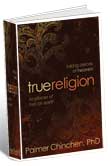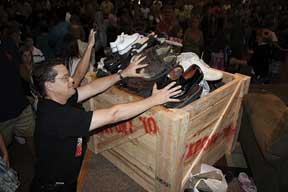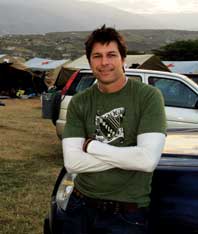
By Ronald E. Keener
Palmer Chinchen Lead Pastor; The Grove, Chandler, AZ
Most pastors speak about missions work from afar. They may have visited a missions field overseas, as their congregations have built trust and friendships over the years. But there are few pastors who have lived 10 and more years “in the bush” among indigenous peoples as Palmer Chinchen has done. The pastor of The Grove, a 1,500-person congregation in Chandler, AZ, lived with his parents in the jungles of Liberia between the ages of six and 16.
“At age six my parents moved our family deep into the Liberian rainforest. The only way in and out was on a Cessna 180 bush plane. Our house was made of bamboo mats and I had a pet chimpanzee named Tarzan,” he says.
Chinchen says that for seven years his only friends were Liberian kids in the jungle. “They called me Yomplu — which means “White Spirit.” Most of the Sappo people had never seen an American, so when my father went to preach in villages on the weekend and the kids saw me and my twin brother they would run in terror, screaming “Yomplu, Yomplu!” The name stuck.
After seven years in the jungle his family moved to a city-center in Liberia where his father, John W. Chinchen, founded African Bible Colleges and opened Liberia’s first Christian college. His father then went on to found Christian universities in Malawi and Uganda as well. His dad is still in Africa, at 86; as well as his twin brother Paul, sister Marion Spencer, and another brother Del, and their families. All serve on the faculties of one of the universities.
Do you look at life here today differently at age 46 after having had that experience?
I hope it has caused me to care about “things” less. As Americans most of us have houses and garages full of cheap junk. I do my best to encourage the people of The Grove to live simply; care about “stuff” less — and care about people more.
How has your African upbringing affected your sense of faith and expression of Christianity and the obligations the church (at large) might have for others in Africa?
I learned a lot from my dad. He had pastored several churches in Washington, California and Mississippi before we moved to Africa, but I think he tired of the routine. I think he was ready to live differently. He seemed never afraid to take a risk, he was always full of faith, and he seemed oddly convinced that God could use his one life to change a continent. I try to live that way.
There are criticisms of short-term missions of from one to three weeks to places like Africa, often with youth groups. How do you see short-term missions and what models of missions work might you suggest to congregations trying to reach out to Africans?
I believe one answer is to form long-term relationships. Two, partner with the local church or ministry. Three, invest your time in work and ministry that is sustainable.
But we can all learn from the emerging generation that is willing to go. They are bothered by injustice. They have a heart for compassion. They will go anywhere, sleep anywhere, eat anything. Don’t criticize, learn from them. Maybe most importantly, realize that when people leave this county to serve it becomes life-changing for them, and that’s a good thing.
What is The Grove’s mission work today to Africa? Where are you working, what is the impact, what are your hopes for the near-term in making a difference?
Right now the fires are burning in Africa, that’s why we have focused our efforts and resources there (and now Haiti as well). The problems of disease, poverty and injustice are most pronounced on the African continent, so as Christians we must do all we can to change that. I think God will ask us about what we did or did not do in Africa.
A few of the things we are currently involved in is distributing mosquito nets to children in Malawi. For the third summer in a row we’ve had teams of high schoolers going hut to hut giving away nets. We also partner with Children of the Nations in Malawi to love and care for the swelling population of orphans.
Clean water and water for farming is a huge problem in Malawi. That’s why for the past three years The Grove has been digging wells in Malawian villages, who’s water source is usually a murky swamp.
In Liberia we have put our efforts into education. After 15 years of civil war people are hungry to learn. We are currently helping ABC University (African Bible College) rebuild its campus that was destroyed during the war, as well as doing literacy training for teachers. In Uganda, we have sent trauma counselors to do training for pastors and college students who do counseling among the women and children who have been abused by the LRA rebels in northern Uganda.
Did you reach out to Haiti at the time of its disaster?
Immediately after the earthquake we sent down a team of doctors and nurses who ran a pediatric clinic, primarily caring for 11 children with amputations. We sent a separate team of 24 eight weeks after the earthquake who build a dorm for 25 orphans who were sleeping under a tent.
Tell me about your father’s work and African Bible College and the impact that that institution is making in Africa.
The hope for Africa’s future is Christian leaders. Men and women who will lead countries and businesses and schools and churches with determined integrity and Godly character. The ABC Universities are raising up that kind of leader.
Most Americans might be excused if they thought living in most African countries is very dangerous indeed. What misconceptions do Westerners have of Africa, or the Christian church there?
Dangerous? Maybe. But isn’t life always a bit better when it’s dangerous. Sure there’re risks. You may contract malaria. You may be hassled at a military check-point. You may get caught in a coup d’état. But the chances are slim. Maybe the greater risk is I could waste my life. I could spend a lifetime believing the problems of this world are someone else’s problem. They’re not. God put us here to, as Jesus said, care for the oppressed, love the sick, feed the hungry — and give them the hope of God.
What is Barefoot Sunday at The Grove all about?
More than a billion people go barefoot everyday and I wanted the people of The Grove to help change that, and to empathize with people who live that way everyday. So about a year ago I asked everyone to come to church wearing their best and favorite shoes, then take them off and go home barefoot. Our team heading to Africa would pack their shoes and give them away.
I’ve never heard of a church anywhere trying something like that, but I really did believe that leaving church barefoot would help our people get the idea that this world is a broken place and if you fully believe your life — your one and most important life — can make a difference, then you will care less about things like shoes and more about loving people who hurt.
We ended up with a mountain of shoes, somewhere more than 2,000 pairs. I just returned from Liberia where we had a team of guys on dirt-bikes riding jungle trails every day for two weeks giving shoes away to children and people who were barefootgo to www.barefootsunday.org.
The congregation also does something called “Live Love” in a blighted neighborhood in Chandler that has involved other churches too and some 800 people?.
Live Love is a ministry that has grown out of The Grove, led by one of our pastors, Paul Gunther, and his wife Melinda. Four years ago they held their first Live Love day and invited not just people from our church but people from other churches and the community to come help transform Chandler’s most troubled neighborhood — by painting houses, cleaning yards, landscaping, and loving people.
Hundreds of homes and yards and families and lives have been changed. Also, on the last Saturday of every month we send teams into this same neighborhood to love and care in the name of Christ. Our annual Live Love day is coming up again, and we are so encouraged by how many more churches and organizations and business and neighbors are willing to get involved. Given the attractive, upper-income, suburban setting of The Grove, is there any difficulty of making the translation of members of
The Grove to these places of need in your city?
Sometimes churches get lost in pursuing growth and numbers and buildings and programs and we lose our impetus. We can spend all our time and resources and ability simply feeding our church machine. I like to describe The Grove as a missional church, because our focus is out there. Yes, we work hard to grow people in their relationship with God and we teach and equip, but God sent us out there. You see, we are a sent people.
www.TheGroveAZ.org
__________________________________________________________________
Brokenness doesn’t have to remain
 “This world is a broken place, but it doesn’t have to be that way. God wants to use your life to change that. And when you live that way, he changes you! I’m fully convinced there’s a kind of spiritual transformation we experience only when we leave our places of comfort to give the love and hope of God away in places that are like hell on earth.”
“This world is a broken place, but it doesn’t have to be that way. God wants to use your life to change that. And when you live that way, he changes you! I’m fully convinced there’s a kind of spiritual transformation we experience only when we leave our places of comfort to give the love and hope of God away in places that are like hell on earth.”
— Palmer Chinchen on why he wrote True Religion: Taking Pieces of Heaven to Places of Hell on Earth (David C. Cook, 2010).
__________________________________________________________________
We don’t “take” an offering here
The church does not collect an offering during services. They use online giving and offering boxes at the rear of the auditorium. Chinchen talks about that decision:
 People often use the words authentic or genuine to describe the atmosphere at The Grove. That’s one of the reasons we decided years ago to put giving boxes by the door, rather than pass an offering plate. It felt more natural this way, like people give because they really wanted to. At the same time, every Sunday we do explain that giving is an important part of worship.
People often use the words authentic or genuine to describe the atmosphere at The Grove. That’s one of the reasons we decided years ago to put giving boxes by the door, rather than pass an offering plate. It felt more natural this way, like people give because they really wanted to. At the same time, every Sunday we do explain that giving is an important part of worship.
When we first started doing this approach a number of people warned, “Your giving will drop!” Our giving went up.
We also make online (electronic) giving an option. Several years ago I had a guy in his early twenties come up to me after church and say, “Palmer, you need online giving. I don’t carry a check book!” And guys in their twenties never have cash either. He had a point: The emerging generation does everything online.
But here’s the bottom line, one of the things I really love about The Grove is that we have a culture of generosity. We are very blessed that way. We rarely make going about money, but sometimes it’s needed, like the week we sent doctors and nurses to Haiti. On that Sunday we asked people to give to help purchase their plane tickets and pay their in-county expenses, and people gave more than $15,000.
In December we took our annual Christmas missions project offering. We needed $50,000 to rebuild the final building on the ABC Liberia campus. In one offering our people gave $110,000. That’s why I say I’m very fortunate to be among a very generous people.





Thanks for ministering for Jesus Christ as did Dr. Jack Chinchen. Rev Jack was my Acts, Joshua, Exodus, Business Ethics, and Sermon preparation professor till 1997.
Am happy you following in his footsteps.
Watched the memorial fore your brother Paul. Was so moved. Your Mom and my mom were half sisters. Her name was Nancy Robertson Jost. she lived in Gulfport MS. I live in Dana Point CA.